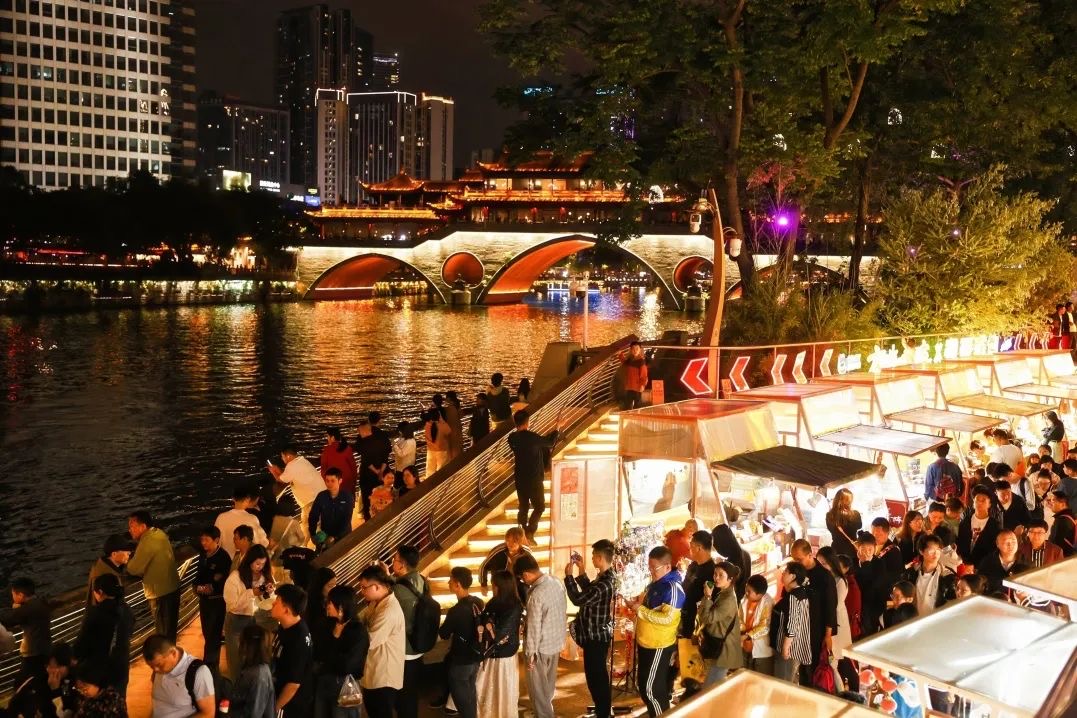Many small businesses in China have faced economic pressure due to the outbreak of the epidemic. Has the Citywalk project in Chengdu brought about a turnaround and new challenges for these frustrated small businesses?
At 11 pm in Chengdu Citywalk area, café owner Aimee Lee is still welcoming a steady stream of customers. “This is when the real magic happens,” Aimee says.
At 11 pm on a typical Sunday, Chengdu is alive with energy, its Citywalk area pulsing with activity as businesses prepare for the evening rush. For Aimee, the rapid recovery and growth she’s witnessed at Taketen Café since the launch of the Citywalk project has been nothing short of astonishing. “We never imagined it would have this much impact,” she says, her eyes lighting up with excitement.
Cafe Taketen is located at such a lively intersection, and in the evening, staff began moving more tables and chairs outside to welcome visitors and locals alike.
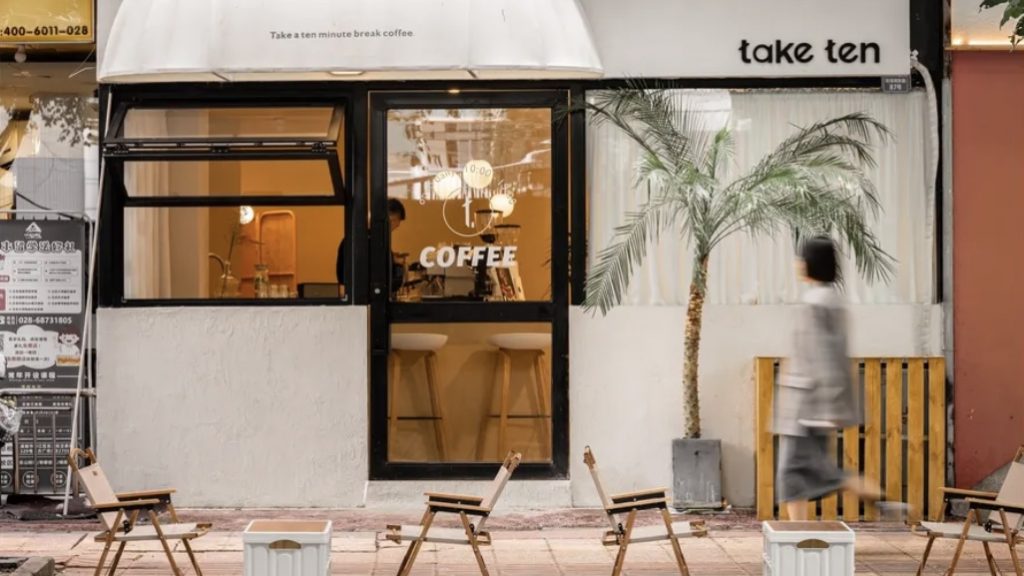
Aimee Lee, manager of Taketen Cafe Bar, was pleasantly surprised by the market’s rapid recovery after the outbreak. “Initially, we only hoped to bring some extra customers through Citywalk, but the actual effect has far exceeded our expectations. We have noticed that cafe sales can increase by up to 20% during Citywalk events, especially on weekends. This growth is not just digital, it has truly changed our business model and the way our customers interact,” Aimee says.
In Chengdu’s bustling Citywalk area, Taketen Coffee has become a phenomenon that cannot be ignored.
Owner Aimee Lee, an entrepreneur with a design background from Sichuan Fine Arts Institute and University of the Arts London, is finding her way to success in a complex market environment through her in-depth understanding of consumer behavior and continuous innovation in business strategy.
“Citywalk gives us the opportunity to reach new customers, especially those interested in local culture and specialty coffees. In order to increase the turnover in all aspects, we positioned our store as a coffee bar, mainly selling coffee during the day, mainly selling wine at night, but also providing coffee options, because some customers really like to have a cup of coffee in the evening. In addition, we continue to introduce seasonal restrictions, constantly update our menu, and have designed some specialty drinks and snacks specifically for Citywalkers. These new products are designed to continuously improve customer satisfaction and repeat purchase rates,” said Aimee.

Currently studying for an MBA at Fudan University, she is turning her design expertise and keen insight into market dynamics into part of a sustainable business strategy.
Based on the analysis of the traffic and market dynamics brought about by Citywalk, Aimee is constantly adapting its business model to the rapidly changing consumer needs and market conditions.
“Although sometimes you have to admit that the market is moving faster than we expected. Especially after the epidemic, there is a general consumption downgrade among consumers, and their behavior and expectations have changed significantly. They expect better experiences at lower prices and higher service standards. This means that we face a serious cost control challenge, because while maintaining high quality service, raw material and operating costs are also rising. In particular, we have late opening hours, and while on the one hand we can boost spending on the Citywalk at night, it also means we need to recruit extra staff for the evening shift.”

“More importantly, the Chengdu restaurant market is extremely competitive, and new stores are springing up like mushrooms. In order to remain competitive, we must not only innovate to attract customers, but also ensure that our team can keep up with this rapid market change,” she said.
In fact, the concept of Citywalk originated from London, UK. It refers to a new lifestyle of humanistic tourism in which participants walk on a unique urban route under the guidance of professionals in a planned way to explore the changes, history and culture, fashion and innovation of the city from the perspective of tourism.
Elsewhere in Europe, the French are also faithful practitioners of urban roaming throughout history. As early as the 19th century, there was a group of people called flâneur (The Rover), who walked the streets with the attitude of connoisseurs, aimlessly observing cities and people. The classic scenes of walking the streets of Paris in the film can be seen everywhere: the writer Gil, the hero of Midnight in Paris, strolls the streets of Paris at midnight and accidentally takes a carriage leading to the golden age in his mind; In the Sunset of Love, the men and women meet after many years and chat about a small part of the film on the streets of Paris.
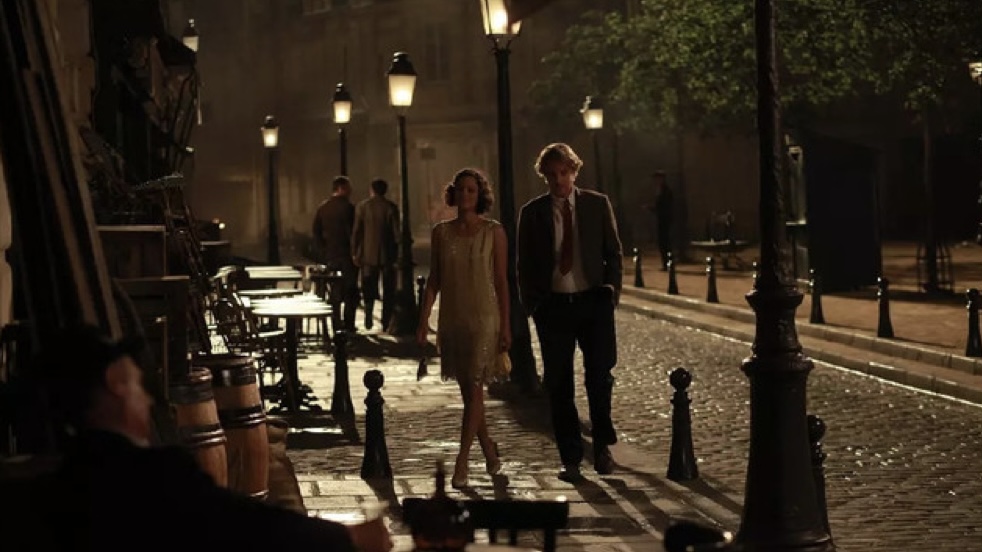
However, in China, Citywalk has taken on a new meaning, especially in Chengdu, which is redefining the concept of Citywalk, as the city has not only been awarded the title of “Gastronomic Capital” by UNESCO for its unique culture and vitality, but also the first city in Asia to be awarded the title of “World’s Best Tourist Destination City”.
Professor Dan Chu from Chengdu University, who studies tourism economy, said, “After experiencing the lockdown during the COVID-19 epidemic, Chengdu urgently needs to revitalize its economy and expand domestic demand. Residents and visitors alike are eager to get out of their homes and find a new way to live and relax in Citywalk at the lowest cost.”
Under Chengdu’s night sky, it’s not just the stars that shine. In 2022, the Chengdu municipal government unveiled a huge “naked eye 3D” screen in the city center, a technological marvel that quickly ignited the curiosity of citizens and visitors.
When night falls, the screen comes alive with giant pandas and butterflies. This beautiful sight stops Citywalkers in their tracks, making them pull out their phones and cameras to capture the moment. It’s quickly becoming a new landmark in the city.
This vibrant corner of Citywalk not only makes Chengdu’s evenings more enchanting, it also means that the good news has spread across the globe.
On Instagram, a video showing a 3D panda playing has topped 2.24 million views and more than 100,000 likes. This new ‘Internet celebrity’ spot in the city not only provides viewers with a visual feast, but actually puts Chengdu on the radar of a global audience.
“The big 3D screen is not just a technology showcase, it has become a symbol of our city’s culture and innovative spirit.” Professor Chu says, “In the post-pandemic era, this innovative model is the key to attracting domestic and foreign tourists, allowing them to experience the vitality of Chengdu Citywalk, while significantly improving the local economy.”
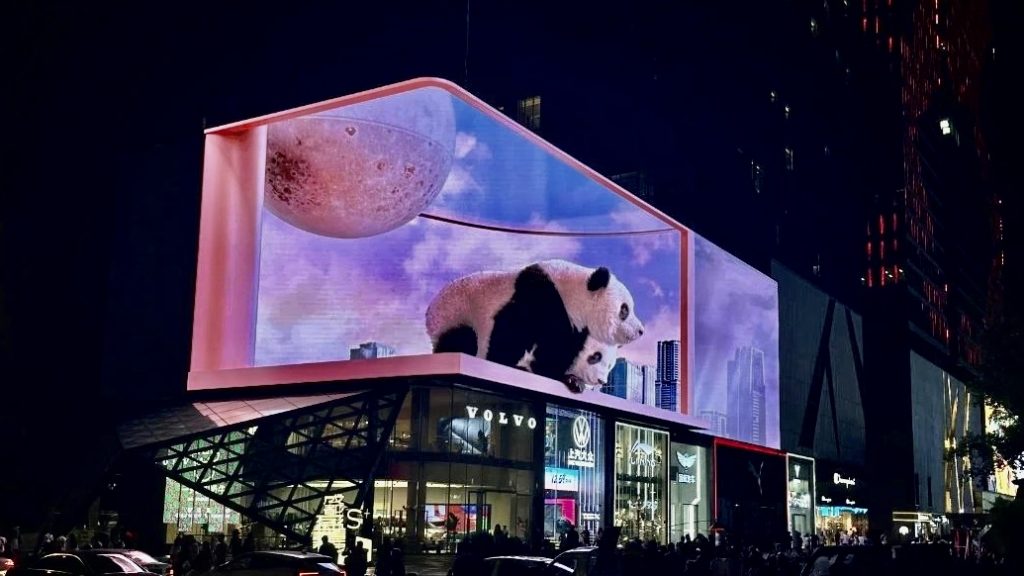
According to the big data of China’s well-known travel website Hornet’s Nest, the popularity of Chengdu’s Citywalk in June increased by 121% from the previous month, and more than 70% of tourists chose to take a “zero cost” Citywalk in Chengdu.
Meimei Liu operates a Chengdu gift store around the 3D large screen, she said “Some customers may only visit our store at the beginning, do not intend to buy goods, but they are often attracted by our unique handicrafts and local snacks, and eventually become buyers.”
Since the launch of the Citywalk program, the gift store has seen a significant increase in sales. For example, in the same period last year, their monthly sales were around CNY 30,000, and after the launch of Citywalk, this figure increased to CNY 50,000, an increase of nearly 67%.
“Our particularly popular items include hand-painted panda ceramic cups, Chengdu tea culturally-themed tea sets, and creative snack packs representing Chengdu street food. In addition, our traffic has increased by about 40%, especially on weekends and holidays.”

“Panda peripheral products are particularly popular with tourists, from cute panda dolls to practical backpacks with panda patterns, which have greatly attracted the interest of tourists at home and abroad. Every product in our store tells the story of Chengdu, so that each customer not only buys an item, but also takes away a unique memory of Chengdu,” Meimei says.
In April 2024, China Central Finance released the first “China Night Economic Vitality Index Report”. According to relevant data, Chengdu tops the list of cities with the most active night consumption.
Chengdu’s Citywalk stands out among other cities in China because of its unique geographical location and environmental conditions.
Located in the Sichuan Basin in western China, Chengdu enjoys a special geographical environment. Due to the longitude and latitude characteristics of the Sichuan Basin, Chengdu’s summer sunset is late, which provides longer natural light for night activities, thus extending the business hours of businesses.
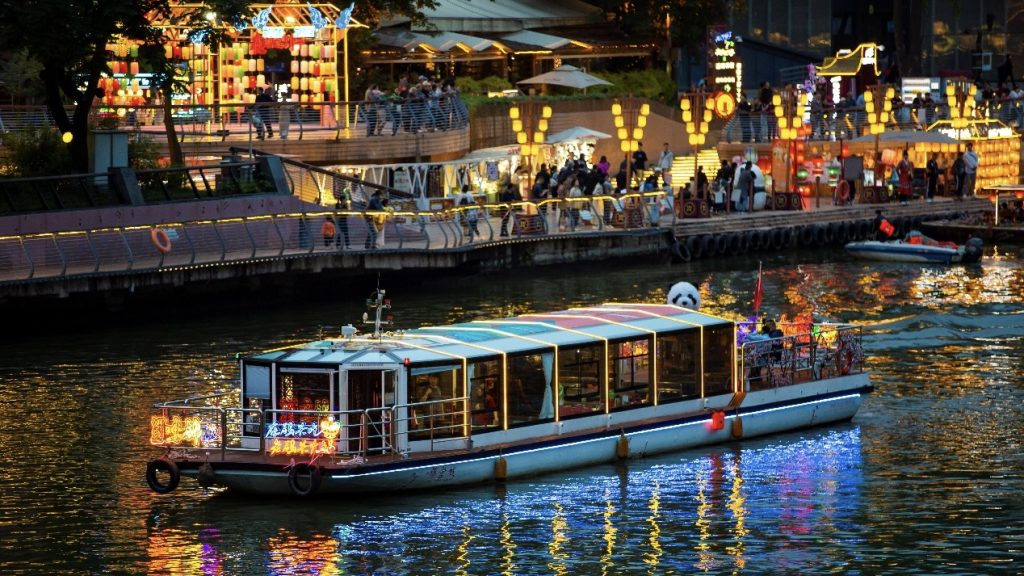
In the summer, the sky fades as late as nine o ‘clock, leading to the emergence of more Citywalkers with the attributes of late sleepers.
In a sports bar located in the bustling city center, the owner Henry Wei has launched a special night watching event for football fans during the European Cup in the summer of 2024.
“Starting in June 2024, we noticed the huge potential of Chengdu’s night economy and people flow. During the European Football Championship in particular, we decided to extend our opening hours to accommodate live matches from 9pm to 3am Chinese time. In order to attract more young football fans, we installed a huge TV screen outside the store to show all the matches and put up posters of the participating teams. When some Citywalkers come to us, they see the facilities and they want to stay here and watch the games, which is one of the ways we attract customers.
We will also launch different promotions according to different festivals. For example, during the European Cup this year, we will launch some cost-effective packages, if you order a glass of wine, we will give you some extra snacks. We also designed special dining and night snacks, such as cocktails and snacks that imitate the characteristics of different countries, attracting many young people who like to try new things.” Henry says.
Chengdu residents are enthusiastic about Citywalk no matter how late it is, for them, late at night is the golden time to enjoy life and reward themselves.
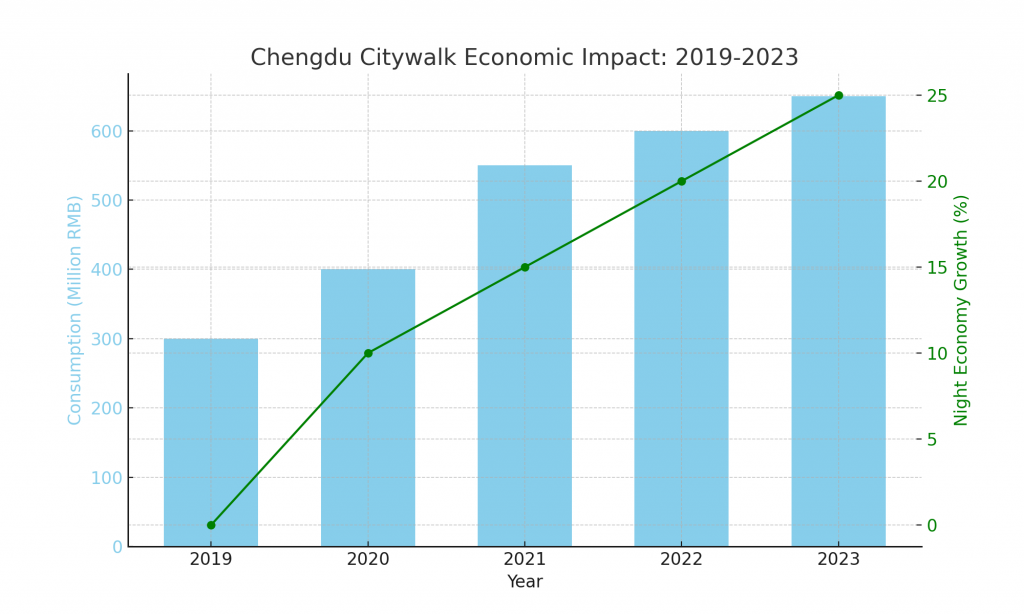
Data source: Chengdu Cultural and Tourism Economic Research Center
Although the European Cup is mostly broadcast late at night in China due to the time difference, for Citywalkers who love nightlife, it seems as though the day has just begun.
“Chengdu people take nightlife very seriously, especially during Citywalk, and their activities are not limited to casual walks, late-night snacks or beer. Here, nightlife is not just a pastime, but a way to seek deeper experiences. Citywalk offers a wealth of options, whether for food or entertainment, to make every night full of possibilities. While Chengdu is known for its slow-paced lifestyle, the night moves at an unusually fast pace amid the light and shadow of Citywalk. Everyone is in a hurry and wants to be able to immerse themselves in more experiences and enjoy more joy of life. This shift is largely due to the pressure of work during the day, which makes people eager to release their enthusiasm for life by participating in Citywalk at night,” says Henry.
This relaxed and cheerful atmosphere is also reflected in the business philosophy of the merchants, who attract and retain customers by creating an intimate and relaxed environment.
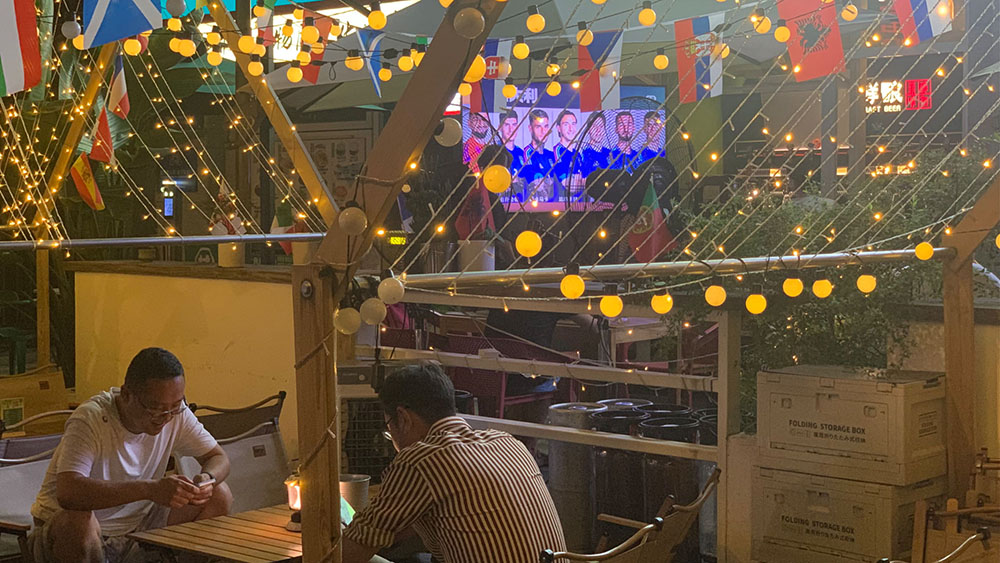
“Our shop is a community shop, not a specific purpose like a high-end bar. Many customers come simply because they are tired, want to rest, or meet new friends and other fans in Citywalk. Our environment is comfortable and not stereotypical, which I think is the natural and intimate atmosphere that Citywalk promotes,” the bar owner says.
In addition, the Chengdu government actively promotes the night economy, and Citywalk activities can often last until three or four in the morning, or even later. This extended business hours not only meet the needs of consumers for nightlife, but also greatly promote the development of local businesses, including catering, retail, entertainment and other industries. By extending business hours, businesses can attract more night-time customers and increase sales opportunities.
Red(Chinese Instagram) data show that the topic traffic of Chengdu Citywalk has increased by 190.93% in the past month, and 82% of foreign tourists said that they would like to try Chengdu Citywalk, which is far more than other travel methods.
For locals, Chengdu’s Citywalk is a surprise trip to discover a “treasure” place on their doorstep. For visitors outside Chengdu, Citywalk is a fresh way to experience the city’s leisure life, history and culture.
“We come from a city that is relatively quiet at night, where the streets are almost silent after 9 p.m. Therefore, we are especially looking forward to coming to Chengdu to experience the night culture of this bustling city. In Chengdu, the enthusiasm and vitality of the nightlife completely exceeded our expectations. We had just walked from a bar street in Chengdu, and even at 11 o ‘clock at night, it was still buzzing with life. This lively atmosphere makes you fall in love with the city at night,” says Kun Chu, a tourist from outside Chengdu.
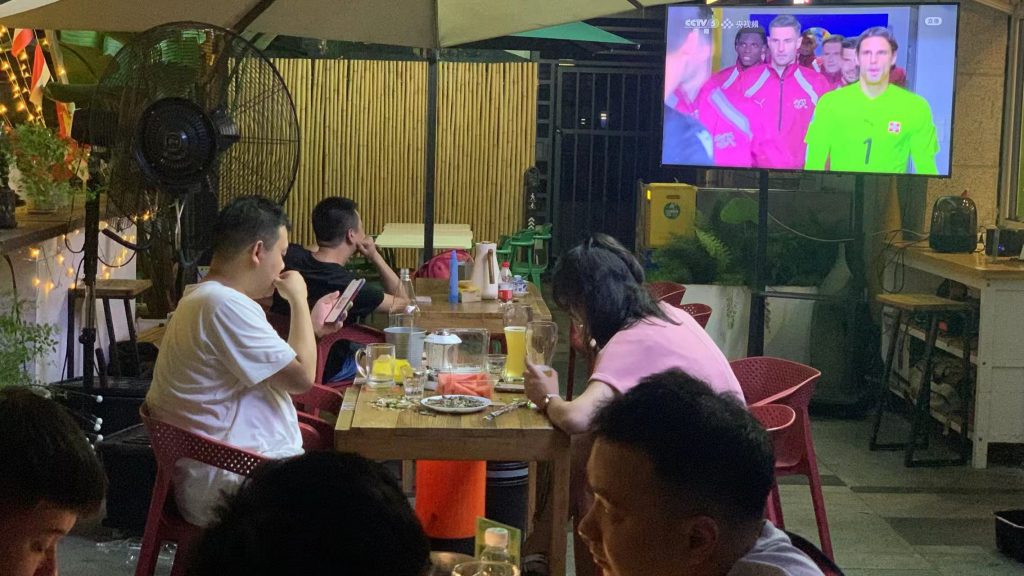
Although Chengdu’s Citywalk has brought significant vitality and growth to the night-time economy, not all members of society have benefited. Some local residents, especially the elderly, find their nights no longer peaceful.
“The needs of businesses and tourists are often put ahead of the needs of residents, especially those with disabilities,” says Yu Zhang, a local resident.
As businesses stay open late in the evening to take advantage of longer business hours, the normal rest of nearby residents is often interrupted. “Noise problems and light intrusion have really become a daily problem for some communities,” community management committee member Lirong Luo said.
In addition, in order to attract more customers and create a lively atmosphere, many restaurants and bars put tables and chairs on the sidewalk, sometimes even blocking the blind path, which seriously affects the normal passage of pedestrians, especially the visually impaired.
This commercial activity on public space has led to complaints from residents in the community, and the community council has received numerous complaints about shops occupying sidewalks and disturbing residents with noise.
A joint complaint letter was sent to the security department requesting stricter regulations to limit the scope and conduct of commercial activities at night in order to safeguard the quality of life of residents and the right of way for pedestrians.
“While the Citywalk project has brought business opportunities and prosperity to the city, there is a real need to find a better balance between commercial development and residents’ quality of life,” says Lirong Luo.
Despite these challenges, the pedestrian streets around Chengdu Citywalk come alive at night. Under the bright lights, it feels more like a vibrant social gathering point than just an ordinary high street. Henry Wei, manager of the sports bar said, “It’s a really vibrant environment. For me, despite the challenges, the whole project was worth it. That’s what we want.”
